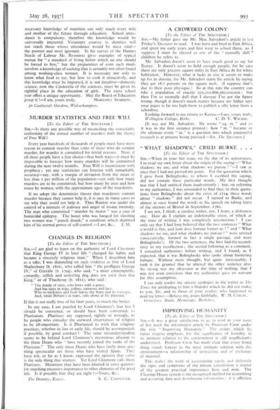CHANGES IN RELIGION
[To the Editor of THE SPECTATOR.]
Sta,—I am glad to learn on the authority of Lord Clonmore that King George IV in later life "changed his habits and became a sincerely religious man." When I described him
as a-rake, I was depending on such evidence as that of Lord Shaftesbury (b. am), who called him "the profligate George
IV," of Greville (b. 1794), who said, "a more contemptible, cowardly, selfish and unfeeling dog does not exist than this King," or of Thackeray (b. 8z r), who said :
"The dandy of sixty, who bows with a grace, And has taste in wigs, collars, cuirasses and lace, Who to tricksters and fools leaves the State and its treasure, And, while Britain's in tears, sails about at his pleasure."
If this is not really true of his later years, so much the better.
In any case, I am puzzled by Lord Clonmore's fear lest I should be converted, or should have been converted, to Pharisaism. Pharisees are supposed, rightly or wrongly, to be people who consider the outward observances of religion to be all-important. Is it Pharisaical to wish that religious practices, whether in late or early life, should be accompanied, if possible, by good conduct ? The same misunderstanding seems to be behind Lord Clonmore's mysterious allusion to the three Deans who "have recently joined the ranks of the Pharisees." The only three Deans who have lately done any-
thing spectacular are those who have visited Spain. They have not, so far as I know, expressed the opinion that cu/tus is the only thing that matters. Yet Lord Clonmore calls them Pharisees. Meantime they have been blamed in some quarters for attaching excessive importance to other elements of the good
life. Is it possible that they are right ?—Yours, &c.,






































 Previous page
Previous page